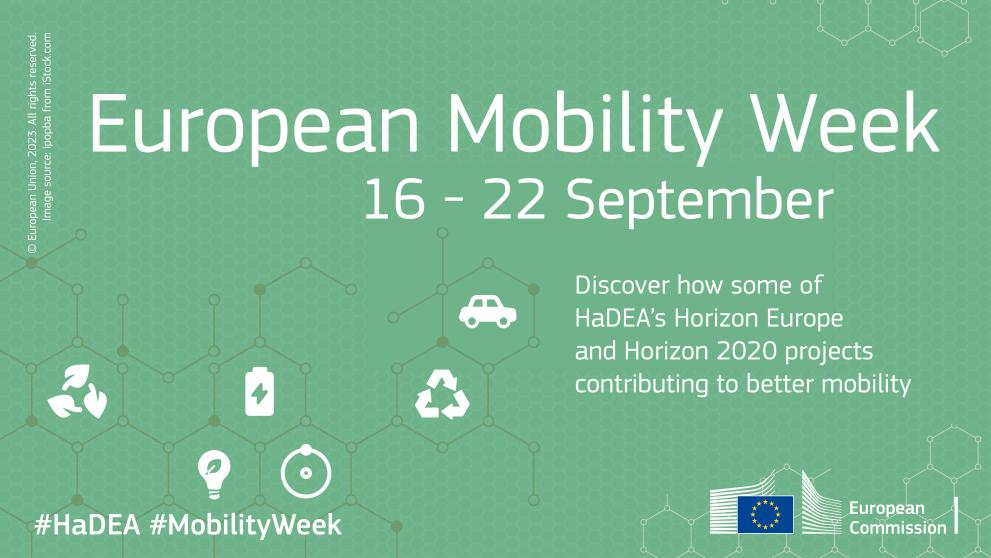
Mobility Week is the European Commission’s flagship awareness-raising campaign on sustainable urban mobility. The event takes place every year from 16 to 22 September, and it promotes behavioural change, favouring active mobility, public transport, and other clean and intelligent transport solutions.
Discover how some of HaDEA’s Horizon Europe and Horizon 2020 projects contribute to these objectives - through advanced hydrogen storage solutions, new high-energy supercapacitors, and a more sustainable production of electric vehicles :
- HEDAsupercap is developing a novel high energy density asymmetric hybrid supercapacitor to take the current electric double-layer capacitors’ (EDLCs) place in the market. A capacitor of this type will consist of dissimilar EDLC-type and battery-type electrodes that, combined with asymmetric cell design and novel materials and parts, will allow for improved energy density. The solution will be promoted across various sectors, including in electric scooters (last-mile mobility), for widespread adoption.
- EMPHASIS is developing green technologies for improving the ecological and financial efficiency of high-energy supercapacitors. These technologies will focus on electrodes, electrolytes and current collectors, optimising them to generate higher amounts of energy at a lower cost and with reduced environmental footprint. Various concepts of supercapacitors will be designed and optimised for the automotive industry (fuel cell-powered vehicles).
- AMBHER is addressing the long- and short-term green hydrogen (H2) storage issue. It is developing advanced materials (catalyst and membranes) for the synthesis of ammonia (NH3) in a cost-efficient and resource-effective process via a membrane reactor. It will also develop new nanoporous metal organic frameworks (MOFs) and a cryo-vessel that can hold stacks of MOF bodies for short-term hydrogen storage. Prototypes will be manufactured for applications in transport and energy.
- HySTrAm is developing innovative solutions to produce ‘green ammonia’ from H2 at lower pressure, thereby making the process more efficient, and with applications in different domains such as industry, energy and mobility. The project will demonstrate a compact containerised ammonia synthesis system based on a short-term storage H2 vessel with new ultraporous material and an ammonia synthesis reactor where the stored hydrogen will react with nitrogen to form ammonia using novel catalysts and sorbents.
- MAST3RBoost is useing recycled raw materials from agroforestry waste biomass and solid urban waste to create a new generation of ultraporous materials for high-density hydrogen storage. As such, sustainable and efficient ways to store H2 are needed to ensure the viable implementation of hydrogen-powered fuel-cell vehicles.
- MOST-H2 proposes an innovative way to store hydrogen efficiently, safely and cheaply – from lab to tank. Researchers will utilise a new class of crystalline materials called metal-organic frameworks that are ideal for hydrogen storage owing to their high specific surface area and tailored pore dimensions. The consortium has a clear view to implement the project results in selected rail and road applications.
- AVANGARD has delivered a comprehensive solution to produce a safe electric vehicle body: a flexible manufacturing environment based on rapid and seamless reconfiguration of machinery and robots. Its automotive body, built with about 10 % of the usual investment, will pave the way to affordable urban fully electric vehicles.
Background
This year’s main topic is Save Energy. Reducing energy use in urban mobility has the capacity to improve sustainability and decrease mobility costs for people and businesses, to support the development of more energy efficient and affordable transport infrastructures, and to move Europe towards a climate-neutral future by 2050.
Horizon 2020 was the EU’s multiannual funding programme between 2014 and 2020. H2020 provided Research and Innovation (R&I) funding for multi-national collaboration projects alongside individual researchers and SMEs via special funding instruments. Horizon 2020 was continued by the Horizon Europe Programme which will run until 2027.
Details
- Publication date
- 15 September 2023
- Author
- European Health and Digital Executive Agency
- Programme Sector
- Industry
- Programme
- Horizon Europe Cluster 4: Industry
- Tags
- EUFunded
- Industrial research
- Innovation
- Raw material
